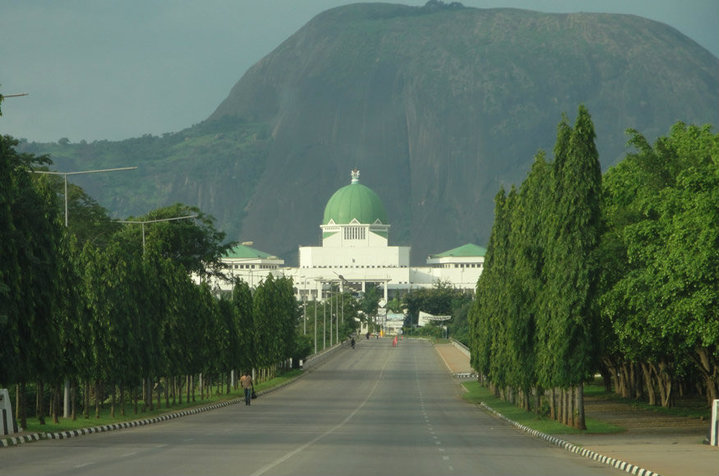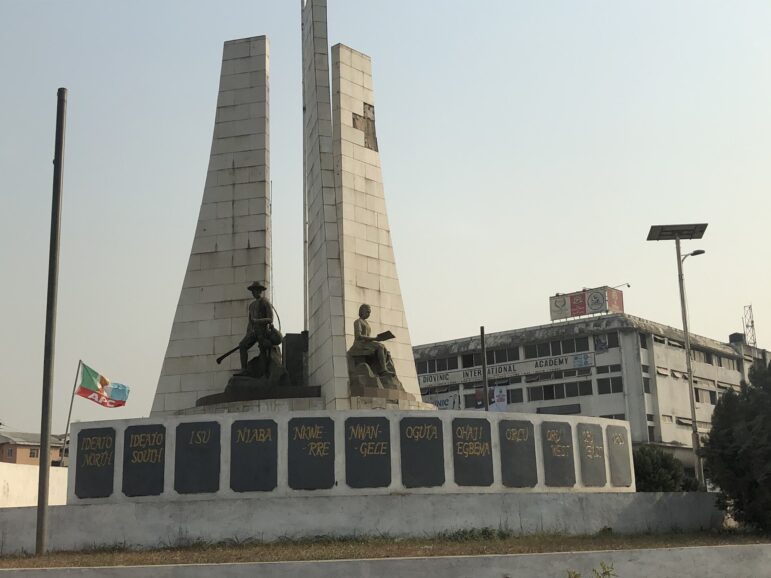ABUJA, Nigeria –
In August of 2023, the Catholic Bishops of Nigeria’s Metropolitan Archdiocese of Owerri (formerly the Owerri Ecclesiastical Province) expressed their collective concern about what they perceive as a rising trend of Neopaganism among Nigerian youth. They claimed that young people were increasingly turning to magical and ritualistic means to acquire wealth, demonic powers, and assurances of protection. The bishops said that these practices inevitably lead to intimidation and criminal activity.
The declarations have reportedly sparked concern among practitioners of traditional religions, such as the Yoruba religion or Ìṣẹ̀ṣẹ often referred to as Ifá or Orisha worship. The Yoruba religion spread beyond West Africa due to the Transatlantic slave trade. It syncretized with other religious traditions in the Americas, resulting in practices such as Lucumí or Santería in Cuba, Candomblé in Brazil, and Vodou in Haiti.

The National Assembly in Abuja, Nigeria. Photo Credit: Manny Moreno
In a statement released following a two-day meeting of the bishops, they wrote, “We are alarmed at the rate at which our young people are relapsing into neo-paganism.” The bishops further lamented that some Nigerians had turned to blaming Christianity for Nigeria’s rising insecurity, poverty, and other challenges. “Under the guise of reviving our Traditional Religion and culture, some of our intellectuals are attacking Christianity as if it is the cause of our present woes,” the Catholic Bishops said.
“This cannot be a way forward for our youths and our society,” they added, connecting via a bizarre turn of logic the rise in violent crimes and ritual killings with rising Neopaganism. They suggested the country is experiencing a resurgence in cults.
“Our help is in the name of the Lord, who made heaven and earth. Let us, therefore, strengthen ourselves with prayers and energize our lives with the word of God, so that we may be the salt of the earth and the light of the world, to eliminate and banish neo-paganism and the works of darkness and evil in our environment,” the Bishops said.
The term “NeoPaganism” in the bishops’ statement is a reference to local polytheism and non-Abrahamic African traditional religions. Adherents to African traditional religions would likely not use this term to describe themselves.
Nigeria, and southeastern Nigeria specifically, has experienced a proliferation of cults that are more akin to organized crime and unrelated to any form of Paganism.
The rhetoric against Paganism has also flourished and, subsequently, Anambra State Governor, Professor Chukwuma Soludo, declared a war on paganism on behalf of Nigerian youth and called upon the Christian community to join forces with the government to eradicate idolatry from the state. “Since the inception of my administration, we have declared war on criminals, their shrines, priests and burnt down their idols. They can come with whatever they want to, but with the Bible in our right hand, we shall prevail. Anambra is in the hands of God,” Soludo said in a speech last year.

Statue Tourist attraction in Owerri Imo State. Photo Credit: FaridhaSL CC BY-SA 4.0]
On Wednesday last week, the war reportedly materialized. A local shrine identified as pagan was demolished by the Anambra government. Other buildings identified as illegal structures were also demolished around the city.
The government’s actions have drawn attention to the issue of paganism in Anambra State, prompting calls for greater understanding and tolerance between different religious groups. The Anambra government, however, has declined to comment on its demolition exercises.
The Nigerian Constitution guarantees freedom of thought, conscience, and religion, including the freedom to change religion or belief and the freedom to manifest and propagate one’s religion or belief in worship, teaching, practice, and observance. Thus, Ifá, Paganism, and Witchcraft are not illegal in Nigeria. These and other spiritual practices exist in a complex social context. Legally, there are no specific national laws in Nigeria that criminalize any such practice. However, practitioners are often stigmatized and accusations of witchcraft, in particular, can lead to serious consequences, including mob violence and extrajudicial actions, especially in rural areas and among traditional communities.
In nearby Ebonyi State last week, for example, the House of Assembly, banned all forms of crusades for spiritual cleansing and witchcraft deliverance through prophecies by clerics to protect the local Izzi community. That community experienced violence after clerics prophesized that the community had to be cleansed.
“This prophecy ignited a serious breakdown of law and order in the village as the youths went on a rampage, destroying Chief Ekpono’s houses and that of his three wives and looting all his property, including cash” House Assembly Representative Abiri Godwin, said. “Fake prophets have taken advantage of the people’s gullibility to instigate crisis in the land. Such a barbaric act has been a sad occurrence in so many communities of Izzi Clan.”
The Wild Hunt is not responsible for links to external content.
To join a conversation on this post:
Visit our The Wild Hunt subreddit! Point your favorite browser to https://www.reddit.com/r/The_Wild_Hunt_News/, then click “JOIN”. Make sure to click the bell, too, to be notified of new articles posted to our subreddit.